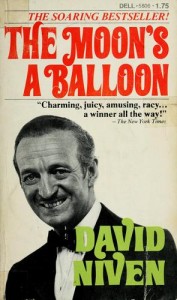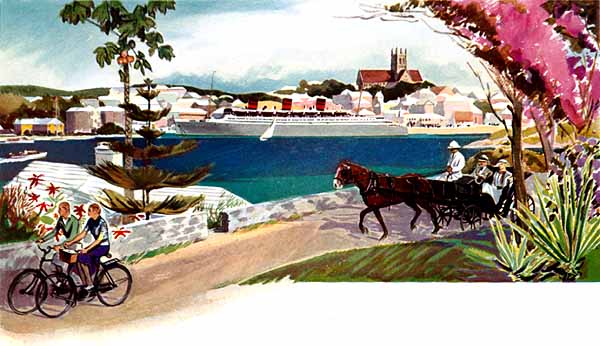David Niven On Bermuda’s “Golden Era”
 David Niven, the actor whose pencil moustache, unflappable nature and effortless charm made him an emblem of British savoir-faire for more than four decades, took a roundabout route to Hollywood stardom — one which brought him through Bermuda in 1934.
David Niven, the actor whose pencil moustache, unflappable nature and effortless charm made him an emblem of British savoir-faire for more than four decades, took a roundabout route to Hollywood stardom — one which brought him through Bermuda in 1934.
Resigning his commission in a Scottish regiment in 1933 and at a loose end, Mr. Niven [1910-1983] travelled to Canada on a whim and then visited New York where he ended up working as a whiskey salesman.
After venturing into an unsuccessful Atlantic City pony racing operation which left him near penniless when it collapsed, he licked his wounds by retreating to Bermuda in 1934 with his friend Maurice [Lefty] Flynn — a former Yale University All-American athlete and sometime actor — and his wife Nora Langhorne Phillips.
As he recounted in his bestselling 1971 autobiography “The Moon’s A Balloon”, Mr. Niven arrived in a Bermuda during a period “that must have been that island’s golden era.”
Staying with the Flynns at a cottage the couple rented on Devonshire Bay, Mr. Niven said Bermuda acted as a balm for both body and soul following his disastrous interlude as an indoor rodeo promoter.
“I spent several blissful weeks on that spectacular island,” said the future Academy Award winner. “… No cars, no motorcycles, just bicycles or horsedrawn carriages … Smiling, happy faces and music everywhere.”
Mr. Niven vividly recalled striking up a friendship with Bermudian Joe Benevides, who served as the Flynns’ regular carriage driver.
“A mixture of Portuguese and Negro blood, he had bright blue eyes and the broadest smile I’d ever seen,” said the actor. “As we clip-clopped along the white coral roads, we passed through orchid farms and dense plantations of palm trees.
“Bright-hued little birds darted in and out of the oleander and giant hibiscus bushes … The sea gulls flying lazily in the blue above had long, graceful forked tails.”
Bermuda Trade Development Board tourism promotional art from 1934
Mr. Niven said he spent his days in Bermuda exploring the island and its many beaches — “we were never out of the water and became burned the colour of mahogany.”
And he spent his evenings wooing a young visitor from Richmond, Virginia.
“She wore a camellia in her hair on the night I took her for a romantic carriage drive in the full moon,” he said. “Joe Benevides, though himself the soul of tact on these occasions, sitting bolt upright on his box and staring straight ahead and oblivious to what was going on behind him, had unknowingly sabotaged my very delicate preliminary moves by giving his horse some wet grass.
“It is quite impossible to impress a beautiful girl with your sincerity if your carefully whispered murmurings into a shell-pink ear have to compete with a barrage of farts.”
While in Bermuda, the course of Mr. Niven’s professional life was set when he received a letter from a friend who had recently moved to California.
Inviting him to visit, the unemployed young Englishman — who had first been bitten by the acting bug as a schoolboy — decided “I might be able to make a go of it in movies.”
Impulsively booking a passage to California by way of Cuba, he departed Bermuda in July, 1934. Through a series of fortuitous meetings and sheer luck he found himself making his Hollywood movie debut before the end of the year in an uncredited bit part as a slave in director Cecil B. DeMille’s epic “Cleopatra.”
His star quickly rose and he went on to appear in such ’30s Hollywood classics as “The Charge of the Light Brigade” [1936], “The Prisoner of Zenda” [1937] and “Wuthering Heights” [1939].
Mr. Niven put his acting career on hold at the outbreak of World War Two in 1939 and returned to Britain to join the army as a lieutenat; he had risen to the rank of lieutenant-colonel by the time he was demobilised in 1945.
Heading back to Hollywood and resuming his career, he went on to appear in such hits as “Around the World in 80 Days”, “The Guns of Navarone” and “The Pink Panther”. He won the Academy Award for Best Actor for his performance in “Separate Tables” [1958] adapted from the play by one-time Bermuda resident Sir Terence Rattigan..
The actor returned to Bermuda for his honeymoon after marrying second wife Hjordis Tersmeden in 1948; his first wife, the former Primula Rollo, who he had married in 1940, died following a tragic fall in 1946.
Mr. Niven took his professional obligations seriously but never his profession; he once said of acting: “It really is amazing. Can you imagine being wonderfully overpaid for dressing up and playing games? It’s like being Peter Pan.”
As well known as an author and raconteur as an actor, he was a favourite guest of talk show hosts in the 1960s and ’70s and gained television immortality of sorts for his bemused handling of a streaking incident during the live broadcast of the 1974 Academy Awards ceremony.
Read More About
Category: All, Entertainment, Films/Movies



Comments (1)
Trackback URL | Comments RSS Feed
Articles that link to this one: